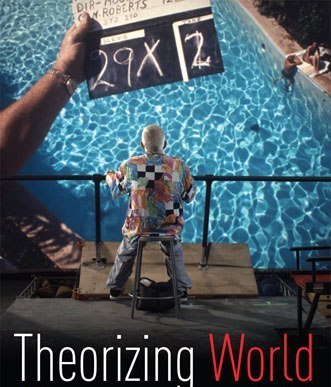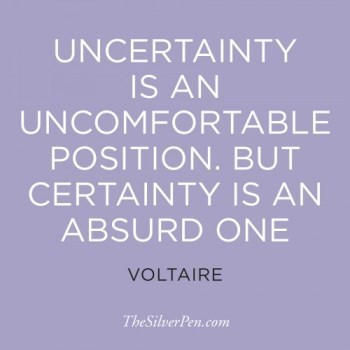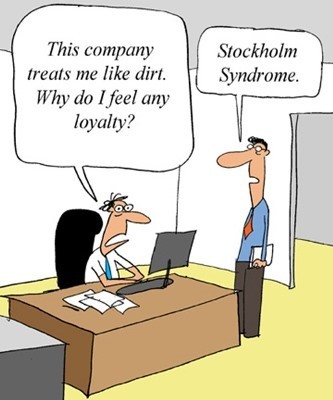Jeremie Averous's Blog, page 125
January 28, 2014
Why we Should Not Try to Understand the World Too Much
One of the most profound quotes I have stumbled upon recently is from Umberto Eco: ”I have come to believe that the whole world is an enigma, a harmless enigma that is made terrible by our own mad attempt to interpret it as though it had an underlying truth.”
 Isn’t that profound wisdom about living in a complex world? Because a complex world is by nature unpredictable, it is not useful to try to theorize what will happen or what lies below. Still, because of our pattern-seeking build, we tend to try to do so. While it is useful to do that at a small scale, it is ineffective to try to do it at a large scale.
Isn’t that profound wisdom about living in a complex world? Because a complex world is by nature unpredictable, it is not useful to try to theorize what will happen or what lies below. Still, because of our pattern-seeking build, we tend to try to do so. While it is useful to do that at a small scale, it is ineffective to try to do it at a large scale.
Theorizing the world will never work. And it is becoming worst as the world becomes more complex every day, with increased interconnections between an increasing number of people.
Umberto Eco goes further by ascribing a lot of the harm around us to this attempt to theorize and make the world predictable. And indeed it is often this attempt that draws crowds to believe in certain things.
It is natural and reassuring to believe that the world is predictable and can be theorized. Unfortunately that’s impossible. This is scary and full of opportunities at the same time. Above all let’s not try to find the underlying truth, let’s let go and the world will be a better place.

January 25, 2014
Why we Need to Become Used to Failing
Following up from our previous post “Why We Should Stop Treating Our Organizations Like Machines“, let us consider for a moment the consequence of looking at organizations like living systems: Darwinian evolution.

Another victim of natural evolution!
Darwin has shown that progress and adaptation in living systems come from the evolution of species, whereby the most adapted individuals transmit their genes more effectively than others. In actual terms, in nature, there are a lot of fatal failures. Those who don’t make it through their lifecycle can’t reproduce. Many adapted creatures don’t make it either, possibly through tough luck.
Natural evolution is all about lots of failures and only a few successes. It is tough. That is scary thought for our societies and for us as individuals. Yet successful companies of the internet know how to nurture many initiatives even if a majority will turn out to be failures. Many other organizations don’t know how to do that, leading to people not taking initiatives at all.
The only way to be successful in the Collaborative Age is to expect failure, or at least lack of success, in the majority of our endeavors. This requires a significant mind-shift. Are you ready for it?

January 23, 2014
How to Resist Patent Trolls (Video)
We have written several times on this blog on the patent troll phenomenon, these entities trying to make money by owning widely applicable patents and attacking normal companies for wrongdoing (links below).
This excellent TED video gives an excellent explanation of the phenomenon and what you should do if it happens to you.
It also reminds a great lesson of what to do when you are taken hostage by someone. Concentrate on your objective and don’t let yourself be impressed.
Follow this link if you can’t see the video.
Previous posts on patent trolls:
How patent litigation cost half a trillion dollar inefficiency in the last 20 years!
Patent trolls and the end of conventional intellectual property
How the fight against Patent Trolls continues: The White House in action!
Hat tip to Tim Berry for the link

January 21, 2014
Why We Should Stop Treating Our Organizations Like Machines
“These days, a different ideal for organizations is surfacing. We want organizations to be adaptive, flexible, self-renewing, resilient, learning, intelligent – attributes found only in living systems. The tension of our times is that we want our organizations to behave as living systems, but we only know how to treat them as machines” says Margaret Wheatley.

Those Amazon basin ants self-organize as floating rafts to survive the periodic tropical inundations. A powerful example of collaborative organization in an unpredictable environment.
This is an absolutely powerful way to expose the tension that increases nowadays between the Industrial Age’s process-driven, “machine-like” organization and the Collaborative Age’s network that serves to produce value.
Comparing the Collaborative organization to a living system is clearly spot on. It is an ecosystem that achieves results through temporary collaboration, creativity through serendipity and random encounters.
Alas, the mechanistic view of organization is still very present. This creates huge waste and low satisfaction of those who participate in these organizations. This tension will increase in the next few years in all traditional organizations until it will resolve either through a crisis or through a transformation.
And you, are you ready to consider organizations as living systems?
Hat tip to Valeria Maltoni for the quote and Robert Branche for the image (on the cover of his new book, “les Radeaux de Feu“).

January 18, 2014
Hope is not a strategy. And Uncertainty is your best friend.
I stumbled upon this statement as headers in a post by James Altucher about what he learned being a trader. As a trader and faced continuously by uncertainty and impossibility to predict the future, he learnt some basic wisdom that should help us in today’s even more uncertain environment.
 Hope is not a strategy: hoping that something will unfold positively in the future, without any underlying indication, is not very useful. It is counterproductive because you won’t be taking any action. Hope is passive.
Hope is not a strategy: hoping that something will unfold positively in the future, without any underlying indication, is not very useful. It is counterproductive because you won’t be taking any action. Hope is passive.
Uncertainty is your best friend: it might be a bit rock-n-roll but only thanks to uncertainty can we hope to create our space in the world. If everything was certain, our fate would be decided and why would we do any effort? How could we expect to trace our own way? It is up to those who know how to thrive in uncertainty to create change in the world and to create success for themselves.
Drop passive hope and work on better taking advantage of uncertainty. These are key skills in the world today. When do you start?

January 16, 2014
Why Security is a Superstition – and What to Do when Feeling Safe
“Security is mostly a superstition. It does not exist in nature, nor do the children of men as a whole experience it. Avoiding danger is no safer in the long run than outright exposure. Life is either a daring adventure, or nothing. To keep our faces toward change and behave like free spirits in the presence of fate is strength undefeatable.” – Helen Keller.

Are you sure you’ll be safe behind these walls?
This is a powerful quote. The late Industrial Age brought us the concept of personal security and stability but that was an illusion, and will ever be. As Helen Keller says, avoiding danger and adventure is no safer than plunging voluntarily into it. Still we seem to have a hard-wired need for a feeling of security. This is visible in many ways in our daily lives.
Again and again, life demonstrates that it is better to be agile and changing than to stay in the illusions of security. Which brings to the following conclusion: when you feel safe, enjoy, but it this feeling stays for too long, maybe it is time to put back into question your personal circumstances and start another adventure. Are you ready?

January 14, 2014
How Crowdfunding Demonstrates the Power of the Long Tail
Kickstarter, a leading crowdfunding site, released very interesting statistics about the crowdfunding activities it supports. On this site, 1 billion dollars of funding will be reached early 2014 with more than 5 million total backers!
 What is particularly interesting is that the long tail, so typical of the Fourth Revolution, is at work everywhere: in the distribution of the value of successful projects (75% of projects have a value of less than 10,000$), in the distribution of the number of projects backed by backer (71% only backed a single project and this represents a stunning 40% of the total amounts spent).
What is particularly interesting is that the long tail, so typical of the Fourth Revolution, is at work everywhere: in the distribution of the value of successful projects (75% of projects have a value of less than 10,000$), in the distribution of the number of projects backed by backer (71% only backed a single project and this represents a stunning 40% of the total amounts spent).
This serves to confirm that crowdfunding does leverages the contribution of individuals in a fully distributed manner. As the US federal government and Security Exchange Commission is finalizing regulations that will allow companies to be funded by crowdfunding within certain limits (read this excellent article on the subject, “The promise and perils of equity crowdfunding“), we do observe a definite shift in the capability of individuals to influence projects and even companies on a global level and a decisive manner.
This is a definite shift in the economical power of our societies. Watch for the creative stuff that will ensue!

January 11, 2014
What to Do When Reaching a Goal Seems Impossible
“When it is obvious that the goals cannot be reached, don’t adjust the goals, adjust the action steps.” – Confucius
 This ancient wisdom is still very much applicable today. It goes against our tendency to let go too quickly of goals that seem unattainable. It just pushes us to revise our present ambitions to avoid despair and still continue towards our lofty goal. It focuses us on adjusting the present level of challenge without doubting that we will reach our goals.
This ancient wisdom is still very much applicable today. It goes against our tendency to let go too quickly of goals that seem unattainable. It just pushes us to revise our present ambitions to avoid despair and still continue towards our lofty goal. It focuses us on adjusting the present level of challenge without doubting that we will reach our goals.
When you are stuck or overwhelmed by the level of challenge, do adjust the steps so that they are smaller and easier. Don’t change your goals!

January 9, 2014
How to Overcome the Stockholm Syndrome of Traditional Employment
Following on our blog “What is so Awful About the Disappearance of Hierarchy?“, and the fact that many people feel attached to traditional hierarchical organizations as a kind of comfort anchor, I find that an interesting phenomenon to prompt thinking is the “Stockholm Syndrome”.
 This psychological syndrome appears after hostage-taking situations, where the hostage might have developed a comfort feeling from small attentions the hostage taker might have had for him/ her. In spite of an overall terrible and violent picture of an hostage situation, it happens that a very strong emotional connection develops, where the hostage defends the hostage-taker. The hostage feels like the hostage-taker cares, whereas this is absolutely not the case.
This psychological syndrome appears after hostage-taking situations, where the hostage might have developed a comfort feeling from small attentions the hostage taker might have had for him/ her. In spite of an overall terrible and violent picture of an hostage situation, it happens that a very strong emotional connection develops, where the hostage defends the hostage-taker. The hostage feels like the hostage-taker cares, whereas this is absolutely not the case.
It might be a stretch, but would it not be a similar case regarding the attachment of many people to traditional, hierarchical organizations? Employees are the first to complain loudly how they feel mistreated, poorly recognized, and how work is a burden; and at the same time, presented with alternative types of organization, they defend the traditional hierarchy because of the comfort provided and the small attentions given from time to time (gifts, bonuses and other recognition material).
We know when we are taken hostage in everyday life when we feel vulnerable, powerless and at the mercy of other people. Don’t let it happen to you even within normal employment: find your freedom space, including financially, and don’t feel at the mercy of your employer. And avoid absolutely the Stockholm syndrome!

January 7, 2014
What is so Awful About the Disappearance of Hierarchy?
As I was giving a conference in Singapore I talked about how the Fourth Revolution will certainly lead to the disappearance of traditional hierarchy in organization.
 The reason is that Industrial Age hierarchy was justified by the scarce and expensive communication capabilities. This resulted in the pyramidal organization, which minimizes the number of links between individuals. Today with cheap and plentiful communication, organizations should become much flatter and networked.
The reason is that Industrial Age hierarchy was justified by the scarce and expensive communication capabilities. This resulted in the pyramidal organization, which minimizes the number of links between individuals. Today with cheap and plentiful communication, organizations should become much flatter and networked.
Anyway I must have touched a ‘hot button’ because my remark did spur a lot of questions. Attendees seemed terrified by the perspective of the disappearance of traditional hierarchy. It might be because it gives some comfort and single point of reference (the boss) which makes it a more comfortable situation to be in compared to being in the midst of a network with uncertainty as to what needs to be done and how. Still some organizations do manage to be successful that operate in a fully non-hierarchical manner (see the blog post on the company Valve).
Removing hierarchy requires each of us to determine its objectives and be self-directed when it comes to what needs to be done. I fully understand that proposition might look scary to those used to work in a traditional environment. Still isn’t it an interesting value proposition that includes more freedom? Is it worth it? Can everyone adapt to this new organization? What do you think?




